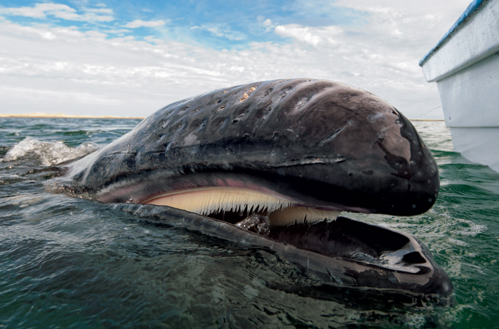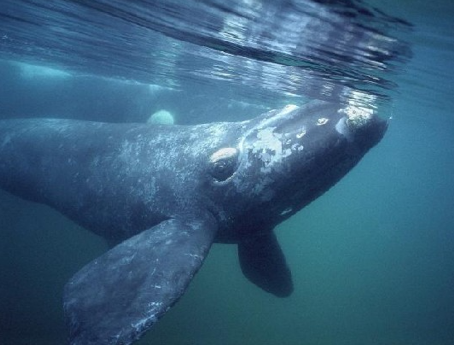|
By Natasha Tucker There are plenty of fish in the sea. This saying is often used when we provide encouragement to those looking for love; but have you ever really thought about our oceans when hearing that phrase? Let’s do that now, and start to think about how many animals actually live in our oceans. If you were to look on Google for an answer, you would come across an exorbitantly large number but – be careful – these results can be deceiving. For example, in 2010, the Census of Marine Life reported that there are approximately 215,000 species swimming in our oceans (and that isn’t just fish)! This certainly gives credit to our beloved saying. Unfortunately, those hundreds of thousands of marine creatures are going extinct at an unprecedented rate. But we must remain positive. With increased public knowledge, we can take action to help keep our aquatic friends and their populations thriving. Case in point, the Grey whale. In the 1900s, this species was a target for whalers, who sought their blubber and body parts for various industrial purposes. This increasing hunting pressure almost sealed their fate and left their numbers at only 2,000. Luckily, outrage from the public put an increasing awareness of these animals, made concrete change to laws, and ensured that Grey whales and their breeding grounds were protected. Today, the Grey Whale’s population is estimated to be at 26,000 individuals. “Smiling” Grey whale in Baja, California - Photo credit Recently, there was a story published about the imminent extinction of the North Atlantic right whale. This past year, there were no mother-calf pairings sighted and 18 recorded deaths. For a worldwide population of only roughly 500, these losses are a significant toll on the species. The most dangerous culprit of their declining numbers, you might ask? Entanglement. Right Whales are becoming entangled in fishing nets and/or suffering from blunt force trauma from boats. What is unfortunate (but perhaps also fortunate for their future survival), is that these deaths are entirely preventable. We don’t like to think about how our everyday actions hurt the natural world, but in being more accountable for our actions and understanding the impact of them, we can make small changes to help keep these incredible animals safe. It might seem insurmountable, but don’t throw in the towel yet! We can all work together to help conserve this – and many other – species. But we must work together. Doing so is not a novel idea, nor without its successes. Don’t believe me? North Atlantic right whale - Photo credit Here in Canada, we have many some huge changes that are definitely worth celebrating. The 2018 budget now reads: “To better protect, preserve and recover endangered whale species in Canada, the Government proposes to make available $167.4 million over five years, starting in 2018–19, to Fisheries and Oceans Canada, Transport Canada and Environment and Climate Change Canada. This includes funding for research to help us better understand the factors affecting the health of these whales, as well as actions that we can take now to help address threats arising from human activities.” High fin to that! People from across the country are working together to lobby the government to make the protection of whales a priority. Apart from providing monetary support to organizations who share this vision, there are other ways to help our fishy friends and the environments in which they live bounce back from the human pressures we have placed on them. All it takes are a few small, but impactful, changes to your day-to-day life. How? Repeat after me: little changes, big impact! The best part about this? It’s already working! According to this article, quick implementations of fishing regulations in 2018 have prevented any North Atlantic right whales from being disentangled. This is a huge success, considering that the same time last year, there were several reports of disentanglements and 6 deaths. This is all possible because we worked together towards a common goal. And it’s paying off big time. Here are a few ideas that you can try incorporating into your daily life to continue to push these successes and others forward.
Try to implement one of these ideas into your life this month. You’ll quickly realise how easy it is to do, and that will hopefully open the door to more possibilities for ocean conservation.  Natasha is a volunteer on the Communications Committee for Back to the Sea Society. She is a proud native of Nova Scotia living in Vancouver and is passionate about the ocean, road trips, and her pet dog and cat. Natasha is an avid advocate for clean oceans and aims to inspire others to get involved too through education, direct action and life hacks to limit use of single use plastics.
4 Comments
Jennifer Love
8/3/2018 06:19:51 pm
An interesting and wonderful article Natasha! Awareness is fundamental for change! Proud of your dedication. Jenn xo
Reply
Barry McMeekan
8/3/2018 08:50:55 pm
YAY Natasha!!!
Reply
Shireen Morgan
8/4/2018 04:30:03 am
Well written Tash, I am so proud of the dedication you have for what you believe in ( as do I ) keep it up !!!!!
Reply
Robert Andrews
8/4/2018 08:12:58 am
Great article tasha.
Reply
Leave a Reply. |
Categories
All
We send blog recaps with in all our quarterly newsletters!
|

